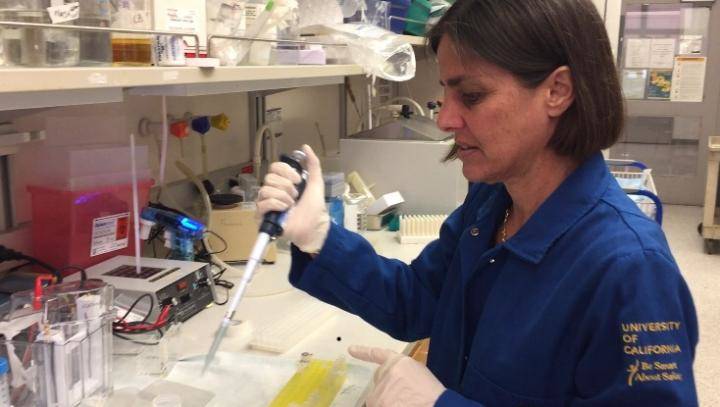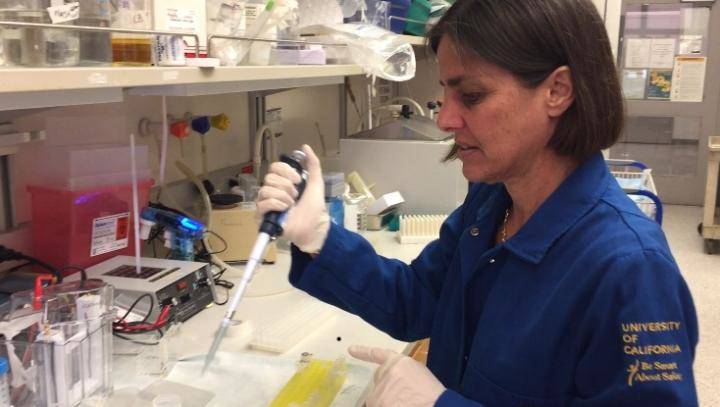
Credit: UCLA Health
Most women experience some morning sickness during pregnancy, but about 2 percent of pregnant women experience a more severe form of nausea and vomiting.
Sometimes the symptoms are so serious that hospitalization is required. Known as hyperemesis gravidarum, the condition is the same one that Kate Middleton, the Duchess of Cambridge, endured in her pregnancies.
A new study led by researchers at UCLA and published in the journal Nature Communications has identified two genes associated with hyperemesis gravidarum, whose cause has not been determined in previous studies. The genes, known as GDF15 and IGFBP7, are both involved in the development of the placenta and play important roles in early pregnancy and appetite regulation.
"It has long been assumed that the pregnancy hormones, human chorionic gonadotropin or estrogen, were the likely culprits of extreme nausea and vomiting, but our study found no evidence to support this," Marlena Fejzo, the study's first author, said. She is an associate researcher at the David Geffen School of Medicine at UCLA. The two genes, she added, coincidentally are linked to cachexia, a weight loss and muscle wasting condition that leads to death in about 20 percent of cancer patients and has similar symptoms to hyperemesis gravidarum.
Fejzo herself had hyperemesis gravidarum and lost a pregnancy to the condition in 1999. The debilitating symptoms can include rapid weight loss, malnutrition and dehydration due to persistent nausea and/or vomiting.
Current medications to treat the condition are largely ineffective and can lead to serious health consequences for both mother and baby. The condition is the second leading cause of hospitalization during pregnancy. Women often require intravenous fluids and, in the most severe cases, feeding tubes.
Previous research has shown that severe nausea and vomiting during pregnancy often runs in families, suggesting that genetics plays a role. For this study, the team compared the variation in DNA from pregnant women with no nausea and vomiting to those with hyperemesis gravidarum to see what the differences were between the two groups. DNA variation around the genes GDF15 and IGFBP7 was associated with hyperemesis gravidarum. The findings were then confirmed in an independent study of women with hyperemesis gravidarum.
In a separate follow-up study, researchers then proved the proteins GDF15 and IGFBP7 are abnormally high in women with hyperemesis gravidarum. They presented these findings at the International Colloquium on Hyperemesis Gravidarum in 2017.
The next step is to determine whether GDF15 and IGFBP7 protein levels can be altered safely in pregnancy to minimize nausea and vomiting.
The findings help to suggest a new avenue of research into a condition for which treatments have progressed little in the past.
"It is my hope that one day a medication that affects this pathway will be used to successfully treat and possibly cure hyperemesis gravidarum," Fejzo said.
###
Co-authors from UCLA include Frederic Schoenberg, Nicholas Mancuso and Dennis Slamon. Additional co-authors include a research team from genetic testing company 23andMe Inc., including Olga Sazonova, J. Fah Sathirapongsasuti, Ingileif Hallgrimsdottir and Vladimir Vacic. Kimber MacGibbon of the Hyperemesis Education and Research Foundation and Patrick Mullin from the Keck School of Medicine at the University of Southern California also participated.
The study was supported, in part, by 23andMe and the participants of 23andMe who volunteered to complete an online survey. Funding came from the Hyperemesis Education and Research Foundation; the Paul and Janice B Plotkin Family Foundation; and grants from the National Cancer Institute/National Institutes of Health and the National Human Genome Research Institute. Fejzo has no disclosures, but co-authors from 23andMe own stock options in 23andMe.
Media Contact
Amy Albin
[email protected]
310-267-7095
@uclahealth
http://www.uclahealth.org/
Related Journal Article
http://dx.doi.org/10.1038/s41467-018-03258-0





